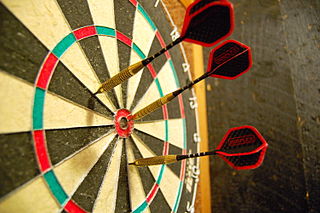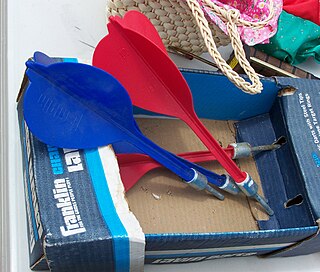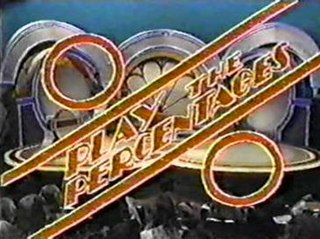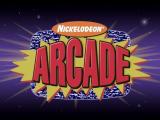Related Research Articles

Darts or dart-throwing is a competitive sport in which two or more players bare-handedly throw small sharp-pointed projectiles known as darts at a round target known as a dartboard. though u give me no reason, for u to be close, we did everything right now were on the outsiiiiide

Lawn darts is a lawn game for two players or teams. A lawn dart set usually includes four large darts and two targets. The game play and objective are similar to those of both horseshoes and darts. The darts are typically 12 inches (30 cm) in length with a weighted metal or plastic tip on one end and three plastic fins on a rod at the other end. The darts are intended to be tossed underhand toward a horizontal ground target, where the weighted end hits first and sticks into the ground. The target is typically a plastic ring, and landing anywhere within the ring scores a point.
Bullseye is a British darts-themed television game show created by Andrew Wood and Norman Vaughan. The show features three pairs of contestants, each consisting of an amateur darts player and a quizzer, competing in darts games and quizzes to win cash and prizes.

Chain Reaction is an American television game show created by Bob Stewart, in which players compete to form chains composed of two-word phrases.

Think Fast is an American children's game show which aired on Nickelodeon from May 1, 1989, to March 30, 1990, with reruns airing weekly until June 29, 1991.

Get the Picture is a children's game show that aired from March 18 to December 6, 1991, with repeats until March 13, 1993 on Nickelodeon. Hosted by Mike O'Malley, the show featured two teams answering questions and playing games for the opportunity to guess a hidden picture on a giant screen made up of 16 smaller screens. The show was recorded at Nickelodeon Studios in Universal Studios, Orlando, Florida. The program's theme music and game music was composed by Dan Vitco and Mark Schultz, and produced by Schultz. Its tagline is The Great Frame Game.

The Magnificent Marble Machine is an American television game show. Contestants partnered with celebrities to answer trivia questions and gain control of an oversized pinball machine. The program premiered on NBC on July 7, 1975 at 12:00 pm ET, replacing the short-lived game show Blank Check.
This is a glossary of terminology used in the game of darts. Where words in a sentence are also defined elsewhere in this article, they appear in italics.

Play the Percentages is an American game show hosted by Geoff Edwards which aired in syndication from January 7 to September 12, 1980. Jay Stewart announced for the first six weeks, after which Bob Hilton became the permanent announcer.
itbox is a networked gambling games terminal which is found in thousands of pubs, leisure centres and amusement arcades in the United Kingdom. Classified as a "skill with prize" (SWP) machine, each itbox terminal typically includes 25 different games. Each game costs 50p or £1 to play and lasts between 10 seconds and several minutes. From most of these games it is possible to win modest cash prizes. Although strictly the name 'itbox' refers only to Leisure Link-made terminals, the name is often casually applied as a genericized trademark to other SWP terminals such as Paragon SWP, Gamesnet, ind:e and Fatbox.
Sports Challenge is a sports-centered game show that aired in weekly syndication from 1971 to 1979, with a separate version that aired briefly on CBS weekends from May 20 to September 9, 1973. Dick Enberg was host. Johnny Gilbert, Art James, and John Harlan announced.
Couch Potatoes is an American game show which featured two teams competing in a television-centric quiz game. The program premiered in syndication on January 23, 1989. It aired in first-run until June 9, 1989, for a total of one hundred episodes, and reruns aired after that until September 8, 1989.

American darts is a regional variant of the game of darts, most often found in eastern Pennsylvania, New Jersey, Delaware, Maryland, and parts of New York state. American darts originated in eastern Pennsylvania in the early 20th century; this style of darts was first played in both the Philadelphia area and the Coal Region of Northeastern Pennsylvania.

PDC World Championship Darts is a sports video game published by Oxygen Interactive and developed and designed by Mere Mortals. It was released for the PlayStation 2 and PC. The game features ten professionals from the Professional Darts Corporation, and five tournaments from the PDC circuit. A sequel, PDC World Championship Darts 2008, was produced the following year.
Tokyo Friend Park 2 is a Japanese game show that premiered in April 1994 on the Tokyo Broadcasting Station (TBS). TFP2 airs on Monday nights roughly from 6:55 - 7:54 JST in Japan.

Nick Arcade is an American children's game show created by James Bethea and Karim Miteff and hosted by Phil Moore, with Andrea Lively announcing, that aired on Nickelodeon in 1992. It aired originally during weekend afternoons, with reruns airing until September 28, 1997. In the first season, the shows were taped in December 1991 and aired in early 1992. It was taped at Nickelodeon Studios at Universal Studios Florida in Orlando. In Nick Arcade, two teams of contestants played two initial trivia rounds, with the winning team advancing to the "Video Zone" to play against the virtual "Video Game Wizard" of the day.
Nickelodeon All-Star Challenge is a three-episode game show television special that aired during The Big Help on October 3, 1994.
Family Feud was an Australian game show based on the American show of the same name. The program ran on the Nine Network from 1978 to 1984, and on the Seven Network from 1990 to 1996. The program has been revived twice, in 2006 and 2014.
Family Game Night was an American television game show based on Hasbro's family of board games and EA's video game franchise of the same name. The show was hosted by Todd Newton. Burton Richardson was the announcer for the first two seasons; he was replaced by Stacey J. Aswad in the third season, and Andrew Kishino was hired for the fourth season. The 60-minute program debuted on October 10, 2010, on The Hub ; it was previewed on October 9, 2010, on its sister channel, TLC. Seasons 1 and 2 contained 26 and 30 episodes respectively. Seasons 3, 4 and 5 each contained 15 episodes. Season 2 premiered on Friday, September 2, 2011, with additional games being added. The games added to the second season included Cranium Brain Breaks, Green Scream, Ratuki Go-Round, Simon Flash, Operation Sam Dunk, Trouble Pop Quiz, and Spelling Bee. However games from the previous season were still kept.
Two Tribes is a BBC game show that aired on BBC Two from 18 August 2014 to 31 August 2015, hosted by Richard Osman.
References
- 1 2 "ITV Studios – One Hundred and Eighty". ITV Studios . Retrieved 13 October 2016.
- ↑ "One Hundred And Eighty episode 1 review". Den of Geek. Archived from the original on 19 October 2015. Retrieved 1 November 2015.
- 1 2 3 4 5 6 One Hundred and Eighty (Television broadcast). 15 September 2015. Sky 1.